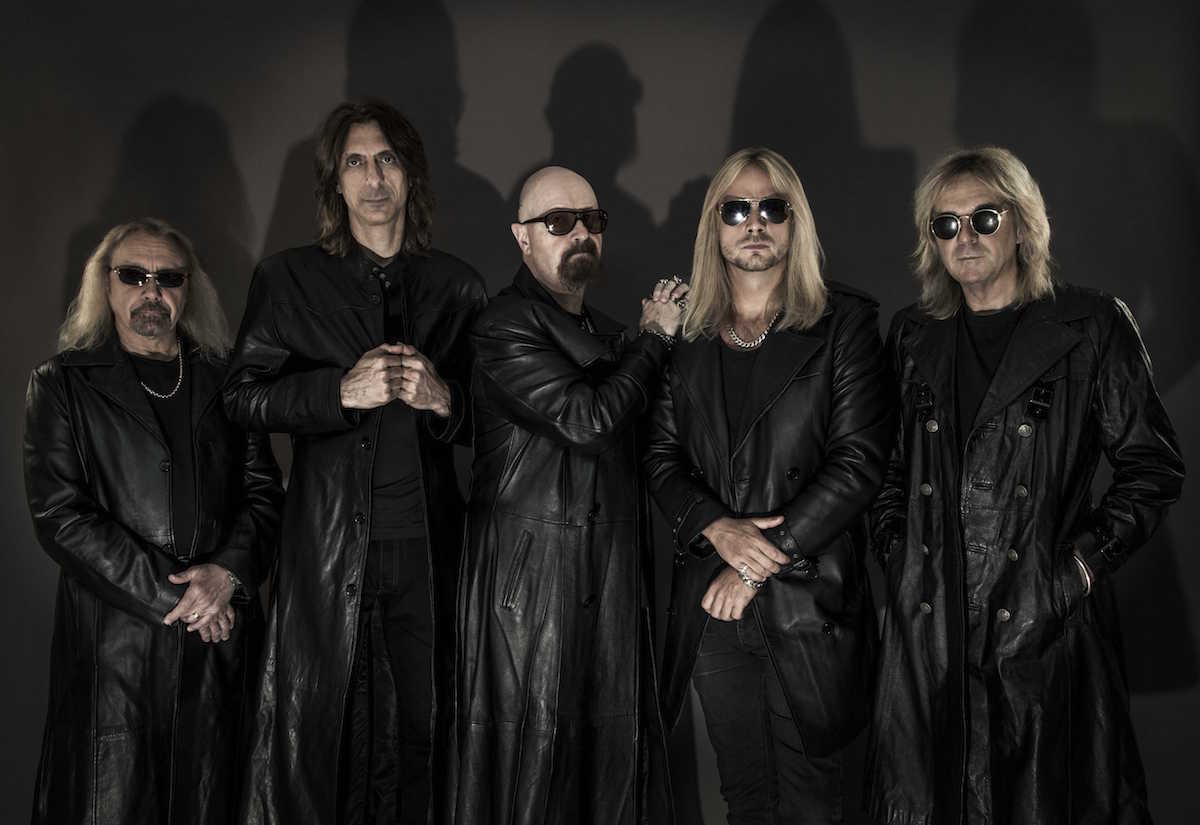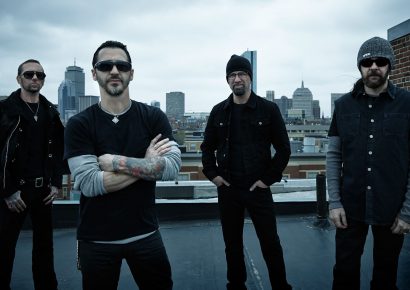Well let’s start with the guitars. Did you have a main axe for Redeemer of Souls?
Yeah, I used primarily the guitars that I was using on stage on the Epitaph tour. The main one is an 80 or 81 three-pickup Les Paul Custom. It’s one of those solid workhorses, y’know? The tuning is great and you know exactly where you are with it. It’s got a great tone, so that was the main guitar I used. Then there were other guitars, and it’s a Priest record so you’ve got to get the whammy bar out… what do you call the whammy bar in Australia? Cos I know that in the US they call it a whammy bar while in England it’s a tremolo arm…
We call it a whammy bar.
Oh so it’s a whammy bar there too!
Yeah. We side with the US on this one, and we side with the UK in using the term ‘valves’ instead of ‘tubes.’
Great, that’s nice and confusing! So yeah, I used two of my custom Flying Vs on it. Some things have different textures or different sounds and you can’t necessarily put your finger on why it works. So primarily it was the three-pickup 80s Custom and the Vs. And then I’ve got another custom V that I didn’t play live, which is a white one and it’s beautiful. It’s based on the ’58 shape, like the Korina V. I used that for a few things. And everything had EMG pickups, either 81 and 85 or the new 57/66 combos, apart from the white V which has stock Gibson factory pickups. So that was it. I don’t think I used anything apart from Gibson, through and through. It’s what I’m used to, what I’m familiar with and what I’m comfortable with. When you’re in that sort of setting you want to be comfortable so you forget the instrument almost. You want to concentrate on what you’re doing and what you’re feeling and worrying about, whether it’s going to respond in the right way. With the Gibsons, I don’t have to worry about it.
This album really sounds like Judas Priest; did you feel any pressure to do that?
Well, I never use the word pressure, really. It’s kinda like energy. You can thrive on pressure but the word pressure kind of has that negative connotation and I’ve never really felt that. I knew as a Priest fan what was expected just going in, before the live stuff. I knew the duty that was bestowed upon me from the Metal God, so I knew what I had to represent and uphold. It was part of my musical character from my early teens anyway. Growing up with bands like Thin Lizzy and their dual guitar attack, Priest, Maiden, it was that metal thing going on, but also the twin guitar stuff. So when you’re writing songs when you’re 13, 14 you look to these guys for a master class on how to write. How they convey emotions with certain textures, or how they put that riff to that riff or change keys there. It was inherent in my musical make-up, so when we got into the studio setting after this Epitaph tour, first of all we’d already built up relationships and gained trust and became brothers over this short amount of time because of the condensed atmosphere of the tour; you live on the road, on the bus, on the plane, so trust is earned very quickly, or it isn’t and you don’t last very long. So when we got into the studio, all of those things came into play. If you’ve got an opinion, put it forward and it’s going to be listened to. It wasn’t a case of “I’m Glenn Tipton, this is my idea, like it or lump it.” It was “Here, what do you think? Got anything to go with it?” It was an incredibly free experience and a creative one. Watching those guys come up with ideas that they add to, or they add to your ideas, it’s just a thrill, y’know? So it wasn’t really a pressure. It was kind of like a duty to yourself and to Judas Priest. You’ve got to do what you do, and respecting first who went before you but also the brand, if you like, of Judas Priest.
When I went in to meet Glenn and Rob the first time, I hadn’t got the gig yet and we had a chat about what they wanted. Glenn said “I feel a bit embarrassed to ask you to play a few things, because if I was put under the spotlight like this, I wouldn’t know what to play. So I feel for you.” And I said “Glenn, I’ve been playing as a lead guitar player all my life. If I can’t play something for you now, with this opportunity, I might as well give up,” y’know what I mean? You’ve been playing all your life and it’s ingrained into you, and when you get an opportunity like that you just have to take it.
Now, I follow you on Instagram and a while ago you were guitar-shopping and you turned to your followers for a bit of guidance on which of two guitars to choose…
Oh yes. I’m always looking for guitars. When we’re on tour, wherever we are, I always dump mybagsinahotel,jumpinataxioratrainor a bus and locate the local mum and pop guitar stores. The smellier the better. I love old guitars, heavy guitars, old Les Pauls that have been gathering dust up on the wall that can tell stories, they’re the ones that I’m after. And there’s this guitar store in Rochester, New York and I went out there after I’d seen a few things online. I’d been meaning to get out there for a while, and they had these two… it was a beautiful custom- order Les Paul with a single P90 and a Bigsby, just beautiful. I thought it was unique and I loved the sound of the P90. And then the Bigsby, it was just a beautiful, beautiful thing. And then they had this custom black V which I was used to playing anyway. And it had the Richlite fretboard so I thought I’d give it a try. I’ve seen various reviews, and the great thing about the guitar fraternity is that everyone’s got an opinion and there’s this great big conversation about weight and resonance, whether a lighter guitar’s more resonant or a heavier guitar is more resonant. I couldn’t care less, to be honest with ya. If it feels right to me, that’s what I’m gonna go with. The Richlite felt and sounded great so I ended up getting them both. They were both black with gold hardware and I couldn’t separate them. I had to do a Wayne’s World; “Not today, my good man, I’m feeling saucy.”

